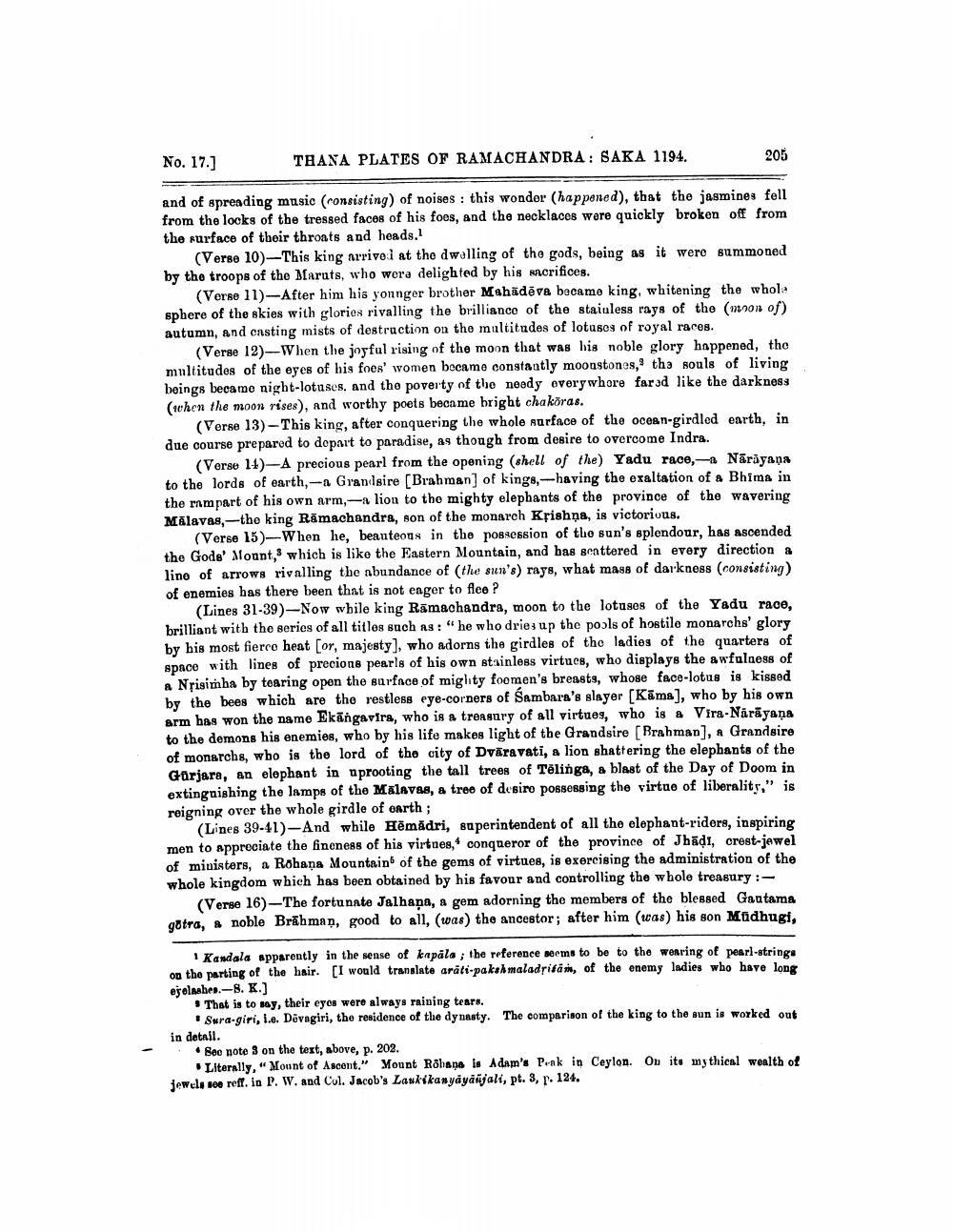________________
No. 17.]
THANA PLATES OF RAMACHANDRA: SAKA 1194.
205
and of spreading music (consisting) of noises : this wonder (happened), that the jasmines fell from the locks of the tressed faces of his foes, and the necklaces were quickly broken off from the surface of their throats and heads.
(Verse 10)-This king arrive i at the dwalling of the gods, being as it were summoned by the troops of the Maruts, who wera delighted by his rncrifices.
(Verse 11)-After him his yonnger brother Mahadeva became king, whitening the whole sphere of the skies with glories rivalling the brilliance of the stainless rays of the moon of) autumn, and casting mists of destruction on the multitudes of lotuses of royal races.
(Verse 12)-When the joyful rising of the moon that was his noble glory happened, the multitudes of the eyes of his foes' women became constantly moonstones, tha souls of living beings became night-lotuses, and the poverty of the needy everywhere farad like the darkness (sohen the moon rises), and worthy poets beon me bright chaköras.
(Verse 13)-This king, after conquering the whole surface of the ocean-girdled earth, in due course prepared to depart to paradise, as though from desire to overcome Indra.
(Verse 11)-A precious pearl from the opening (shell of the) Yadu race, Narayana to the lords of earth,-a Gransire (Brahman) of kings,-having the exaltation of a Bhima in the rmpart of his own arm,-a lion to the mighty elephants of the province of the wavering Mālavas,--the king Ramachandra, son of the monarch Krishna, is victorious.
(Verso 15)-When he, beauteous in the possession of the sun's splendour, has ascended the Gode' Mount, which is like the Eastern Mountain, and has scattered in every direction a line of arrows rivalling the abundance of the sun's) rays, what mass of darkness (consisting) of enemies has there been that is not eager to flee ?
(Lines 31-39)-Now while king Rāmachandra, moon to the lotuses of the Yadu race, brilliant with the series of all titlos such as : "he who dries up the pools of hostilo monarchs' glory by his most fierce heat (or, majesty], who adorns the girdles of the ladies of the quarters of space with lines of precions pearls of his own stainless virtues, who displays the awfulness of a Nrisimha by tearing open the surface of mighty foomen's breasts, whose face-lotus is kissed by the bees which are the restless eye-corners of Sambara's slayer (Kāma), who by his own arm has won the name Ekāngavira, who is a treasury of all virtues, who is a Vira-Narayana to the demons his enemies, who by his life makes light of the Grandsire (Brahman), a Grandsire of monarchs, who is the lord of the city of Dvāravati, a lion shattering the elephants of the Görjara, an elephant in aprooting the tall trees of Télinga, a blast of the Day of Doom in extinguishing the lamps of the Mālavas, a tree of desiro possessing the virtue of liberalitr," is reigning over the whole girdle of oarth;
(Lines 39-41)-And while Hēmādri, superintendent of all the elephant-riders, inspiring men to approciate the fineness of his virtues, conqueror of the province of Jhādi, crest-jewel of ministers, a Rohana Mountain of the gems of virtues, is exercising the administration of the whole kingdom which has been obtained by his favour and controlling the whole treasury :
(Verse 16)-The fortunate Jalhapa, a gem adorning the members of the blessed Gautama gotra, & noble Brāhman, good to all, (was) the ancestor; after him (was) his son Midhugi,
1 Kandala apparently in the sense of kapala; the reference seems to be to the wearing of pearl-strings on the parting of the hair. [I would translate arăti-pakshmaladrifas, of the enemy ladies who have long eyelashes.-8. K.)
• That is to say, their eyes were always raining tears.
Swra-giri, I.e. Dövagiri, the residence of the dynasty. The comparison of the king to the sun is worked out in detail. i Seo notes on the text, above, p. 202.
Literally, Mount of Ascent." Mount Rohana is Adam's Peak in Ceylon. Ou its mythical wealth of jewels see reff. in P. W. and Col. Jacob's Laukikanyayanjali, pt. 3, p. 124.




